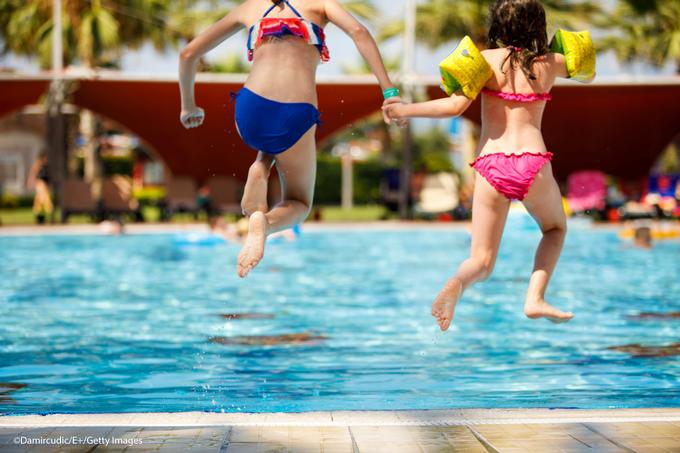
Published 6/5/2018
ROSEMONT, Ill. (June 5, 2018)–For many people, swimming is an ideal way to help beat the summer heat, all while getting a full body, low-impact workout that puts little stress on the muscles and joints. Before you jump-in, remember that swimming and diving in unsafe bodies of water can lead to severe injuries, such as a broken a neck or spine.
According to the Consumer Product Safety Commission (CPSC), in 2016, emergency departments, doctors’ offices and clinics treated:
The American Academy of Orthopaedic Surgeons (AAOS) encourages adults and kids to practice safety precautions to reduce their risk of swimming and diving-related injuries.
EXPERT ADVICE
“Always check the depth of the water before diving in,” said AAOS spokesperson and orthopaedic spine surgeon Eeric Truumees, MD. “If you’re unsure of the depth of the water, go in feet first. Diving in a shallow pool can lead to life threatening injuries or even death.”
The AAOS recommends the following swimming and diving safety tips:
For more swimming and diving safety tips, visit OrthoInfo.org.
More Information about the AAOS
With more than 38,000 members, the American Academy of Orthopaedic Surgeons is the world’s largest medical association of musculoskeletal specialists. The AAOS provides educational programs for orthopaedic surgeons and allied health professionals, champions and advances the highest quality musculoskeletal care for patients, and is the authoritative source of information on bone and joint conditions, treatments and related issues.
Visit AAOS, at:
Newsroom.aaos.org for bone and joint health news, stats, facts, images and interview requests.
ANationinMotion.org for inspirational patient stories, and orthopaedic surgeon tips on maintaining bone and joint health, avoiding injuries, treating musculoskeletal conditions and navigating recovery.
Orthoinfo.org for patient information on hundreds of orthopaedic diseases and conditions.
Facebook.org/AAOS1
Twitter.com/AAOS1
Instagram/AAOS_1
According to the Consumer Product Safety Commission (CPSC), in 2016, emergency departments, doctors’ offices and clinics treated:
- 581,918 people for swimming-related injuries;
- 35,990 people for diving-related injuries; and
- 32,303 people for diving board-related injuries.
The American Academy of Orthopaedic Surgeons (AAOS) encourages adults and kids to practice safety precautions to reduce their risk of swimming and diving-related injuries.
EXPERT ADVICE
“Always check the depth of the water before diving in,” said AAOS spokesperson and orthopaedic spine surgeon Eeric Truumees, MD. “If you’re unsure of the depth of the water, go in feet first. Diving in a shallow pool can lead to life threatening injuries or even death.”
The AAOS recommends the following swimming and diving safety tips:
- Know how to swim. Swim in a supervised area where lifeguards are present. Inexperienced swimmers should wear lifejackets in the water.
- Do not attempt to swim if you are too tired, too cold, or overheated.
- Be prepared for emergency situations by having a plan to reach medical personnel to treat injuries such as concussions, dislocations, bruises, wrist or finger sprains and fractures.
- If diving from a high point, make sure the bottom of the body of water is double the distance from which you're diving. For example, if you plan to dive from eight feet above the water, make sure the bottom of the body of water, or any rocks, boulders or other impediments are at least 16 feet under water.
- Never dive headfirst into above-ground pools.
- Never dive headfirst into water that is not clear, such as a lake or ocean, where sand bars or objects below the surface may be obstructed or not visible.
- Only one person at a time should stand on a diving board. Dive only off the end of the board and do not run on the board.
- Swim away from the board immediately afterward to make room for the next diver.
- Do not drink alcohol before or during swimming, diving, or boating. Alcohol can impair balance, coordination, and judgment.
For more swimming and diving safety tips, visit OrthoInfo.org.
More Information about the AAOS
With more than 38,000 members, the American Academy of Orthopaedic Surgeons is the world’s largest medical association of musculoskeletal specialists. The AAOS provides educational programs for orthopaedic surgeons and allied health professionals, champions and advances the highest quality musculoskeletal care for patients, and is the authoritative source of information on bone and joint conditions, treatments and related issues.
Visit AAOS, at:
Newsroom.aaos.org for bone and joint health news, stats, facts, images and interview requests.
ANationinMotion.org for inspirational patient stories, and orthopaedic surgeon tips on maintaining bone and joint health, avoiding injuries, treating musculoskeletal conditions and navigating recovery.
Orthoinfo.org for patient information on hundreds of orthopaedic diseases and conditions.
Facebook.org/AAOS1
Twitter.com/AAOS1
Instagram/AAOS_1